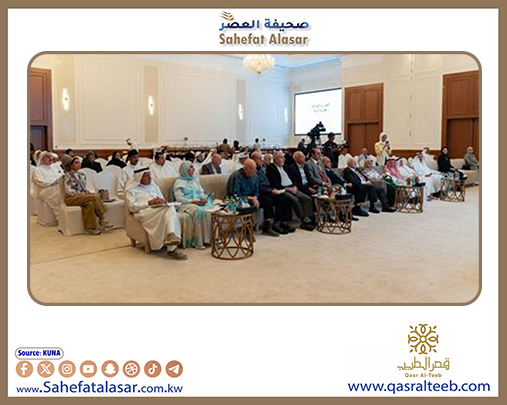


The "Culture in Kuwait Before Oil" symposium held its fourth and fifth sessions on the second day, examining how education, women, and journalism contributed to forming Kuwait's national identity. The event is part of "Kuwait Capital of Arab Culture and Media 2025" celebrations, under the patronage of Minister of Information and Culture and Minister of State for Youth Affairs Abdulrahman Al-Mutairi.
Fourth Session: Cultural Ties and Educational Missions
Moderated by Saudi scholar Dr. Saeed Al-Zahrani, Monday's fourth session analyzed:
Kuwait's cultural connections with Gulf and Arabian Peninsula nations
Pan-Arab cultural relations
The intellectual impact of Arab educational exchange programs
Dr. Fahd Hussain, a Bahraini expert in modern Arabic literature, highlighted Kuwait's unique socio-cultural diversity shaped by its desert-meets-sea environment. He noted how Bedouin-urban interactions and tribal-cosmopolitan dynamics fostered a rich cultural identity, influenced by maritime traditions (pearl diving, fishing) and pastoral life.
Dr. Hussain emphasized Kuwait's historical openness to other civilizations and praised Kuwaiti women's role in cultural enlightenment. He also acknowledged Kuwaiti journalism's impact and Kuwaiti intellectuals' contributions to the Gulf renaissance.
Egyptian scholar Dr. Khaled Azab, an expert in Islamic architecture philosophy, noted Kuwait's early development of a pan-Arab cultural vision through initiatives like Al-Arabi magazine – "a pearl of Arab culture" – and the influential World of Knowledge book series.
Fifth Session: Education as Cornerstone
Chaired by writer Talal Al-Ramidhi, the fifth session featured historian Dr. Ayed Al-Juraid detailing how education became Kuwait's priority in the early 20th century after the pearl market collapse and before oil discovery. Key milestones included:
Establishment of Al-Mubarakiya (1911) and Al-Ahmadiya (1921) schools
Founding of Kuwait National Library
Progressive support for girls' education since 1937 by figures like Sheikh Masaad Al-Azmi
Heritage researcher Badr Al-Zuwayr highlighted Sheikh Ahmad Al-Jaber Al-Sabah's era (1921-1950), when Kuwait invested in education through:
The 1936 Council of Knowledge
Hosting Arab educational missions (1936-1952)
Transforming into a regional educational hub before independence (1961)
Journalism's Pioneering Role
Researcher Saleh Al-Misbah traced Kuwaiti journalism to 1928 when historian Abdulaziz Al-Rashid launched the first newspaper despite technical and financial constraints. He noted how early press:
Overcame lack of printing facilities
Championed Arab and Islamic causes
Introduced Kuwait globally
Complementary Exhibition
The symposium featured a traditional crafts display, including:
Sadou weaving
Qalaf (dhow building)
Publications by the National Council for Culture, Arts and Letters